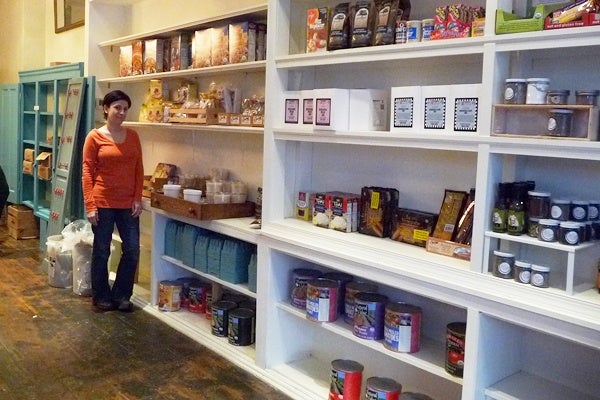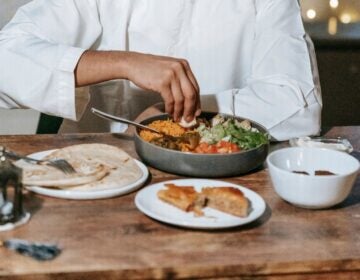How Mt. Airy’s ‘Food for All’ got in trouble and how its customers saved it
-

Amy Kunkle in Food for All last year. (Alan Tu/WHYY, file)
-

-

-

Customers of a Northwest Philadelphia store are pledging $50,000 in loans to keep it open.
Food for All Market in Mt. Airy announced earlier this month that it would close after just 16 months in business. The market sells food for people with food allergies.
Amy Kunkle, owner of Food for All, said nearly two-dozen people have agreed to pool their money to create a single six-year loan at five-percent interest.
In an interview with Kunkle on Wednesday, she was ecstatic about the second chance she’s been given. “My customers came and saved my business. That is unheard of.”
The store at 7127 Germantown Ave. closed on Wednesday and Kunkle said she will reopen on Feb. 10 with a new mix of products.
When her troubles began
When Amy Kunkle tried Groupon last year she thought it would be a great way to attract new customers to her specialty food and deli store in Philadelphia.
But she now admits she didn’t do her homework and nearly gave the store away.
She doesn’t blame Groupon for her $10,000 loss. It’s something she said was just a bad decision on her part.
“In my mind, I was getting the word out about my store to thousands of people, but what really happened is that these people (Groupon customers) were in it for the deal and not necessarily to be return customers,” Kunkle said Wednesday evening.
Her Groupon promotion ran from May through August of last year. It offered Groupon customers $30 worth of merchandise for $15. She did not set a limit on the number of customers who could get this price. Kunkle said she just took the deal that was suggested to her by the Groupon representative. “I made a big mistake doing that,” Kunkle admits. In the end, 451 people used the Groupon deal, leaving her with the $10,000 loss.
Kunkle said she was in no position to take on a high risk promotion. She said, in hindsight, Food for All was under capitalized. So she didn’t have a big enough cash reserve to ride out the promotional campaign.
After Groupon ended, Kunkle said she couldn’t qualify for a traditional bank loan so she turned to her credit card processing company for a high interest loan.
“I was essentially digging a hole to fill in another hole. So the Groupon thing actually cost me more because of this spiral effect,” said Kunkle.
After the promotion ended, Kunkle said she didn’t see a dramatic uptick in repeat customers and she had to hire an additional staffer after one of her business partners left her. Kunkle did not provide NewsWorks with just how high her losses totalled.
On Jan. 10, she announced to her customers via Twitter and Facebook that she would close the store. Kunkle was surprised by what happened next.
“I had phone calls. I had people coming in – in tears saying you cannot close I am going to help you. I will make a loan to you. How much do you need? I decided to go public with that because it was so many people,” said Kunkle.
A few days later, Kunkle issued a public plea for help and announced an emergency fundraising effort to raise $30,000 in loans to stay open.
Why give money to a failing business?
If you’ve been following this story, you know Kunkle’s customers value her business but customer loyalty itself doesn’t explain one big question; Why would anyone give money to a business that nearly tanked in its first 16 months? Kunkle said, she really didn’t have to argue her case.
“To be quite honest I really didn’t have to convince anybody of anything. I had Anne-Marie did all my financials. (Anne-Marie Dunphy is a CFO advising Kunkle at no cost) We were break-even for almost the whole first year up until the Groupon (promotion). You can see how (profits) went down when we started Groupon and then went back up,” said Kunkle.
Her financial supporters clearly believe Kunkle has a good shot at becoming profitable because the money they are lending is part of an unsecured loan or one big I.O.U.
During meetings with her potential lenders, Kunkle said, they did have one question that they really wanted answered: “(They asked) can I personally get up and do this again. After I have been defeated a little bit. And I said absolutely…I told them that I would not commit to taking their money if I wasn’t going to do this (try to succeed).”
A new business plan
When Food for All reopens on Feb. 10, customers will see a slightly different mix of products and an expanded prepared foods menu. She said she will only offer the pre-packaged items that sold well like Gluten-free breads, honey, and maple syrup. “We are going to be more specialized because these are lower-(profit) margin items and moving forward we are going to concentrate on prepared foods,” said Kunkle.
She also plans to add food preparation classes for chefs and restaurant workers to educate them on the needs of customers with food allergies. Food for All will also begin to rent its store space out for events or meetings.
“We have a lot of ideas to generate more income so, going forward, we are expanding and having higher margin items.”
WHYY is your source for fact-based, in-depth journalism and information. As a nonprofit organization, we rely on financial support from readers like you. Please give today.




